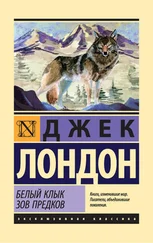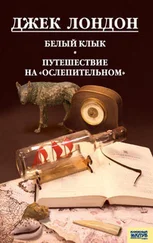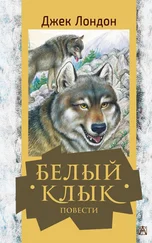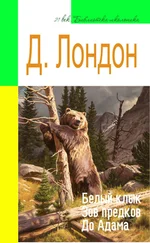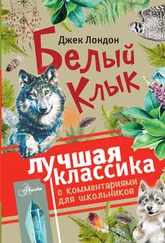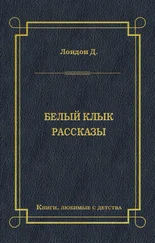The cub had a great respect for his mother. She could get meat, and she never failed to bring him his share. She was unafraid of things. His mother represented power; besides, the older he grew the shorter grew her temper.
Once his mother brought strange meat. He didn’t know it was a lynx’s kitten, nor did he know the desperateness of what his mother did. He only knew it was meat.
With a full stomach, the cub lay in the cave, sleeping against his mother’s side. He was woken by her snarling. Possibly in her whole life it was the most terrible snarl she ever gave. There was reason for it, and none knew it better than she. In the afternoon light, crouching in the entrance of the cave, the cub saw the lynx-mother. He bristled.
Because of the low-roofed entrance the lynx could not go in, and, when she tried to, the she-wolf sprang upon her and threw her down. The cub saw little of the battle. There was an awful snarling. The two animals fought, the lynx ripping and tearing with her claws and using her teeth as well, while the she-wolf used only her teeth.
Once, the cub sprang in and sank his teeth into the hind leg of the lynx. He clung on, growling savagely, and thus probably saved his mother. The lynx’s huge fore-paw ripped his shoulder open to the bone. The fight lasted so long that he had time to cry himself out and to experience a second burst of courage; and in the end he was again clinging to a hind-leg and furiously growling between his teeth.
The lynx was dead. But the she-wolf was very weak and sick. For a week she never left the cave, except for water, and then her movements were slow and painful. At the end of that time they ate the lynx, while the she-wolf’s wounds had healed.
The cub’s shoulder was stiff and sore. But the world now seemed changed. He now had greater confidence. He had fought; he had buried his teeth in the flesh of an enemy; and he had survived. And because of all this, he carried himself more boldly.
He began to accompany his mother on the meat-trail, and he saw much of the killing of meat and began to play his part in it. And he learned the law of meat. There were two kinds of life – his own kind and the other kind. His own kind included his mother and himself. The other kind included all live things that moved. But the other kind was divided. One portion was composed of the non-killers and the small killers. The other portion killed and ate his own kind, or was killed and eaten by his own kind. And out of this classification came the law. The aim of life was meat. Life itself was meat. Life lived on life. There were the eaters and those who were the eaten. The law was: EAT OR BE EATEN. He did not formulate the law; he merely lived the law without thinking about it at all.
He saw the law operating around him on every side. He had eaten the ptarmigan chicks. The hawk had eaten the ptarmigan-mother. The hawk would also have eaten him. Later, when he had grown, he wanted to eat the hawk. He had eaten the lynx kitten. The lynx-mother would have eaten him had she not herself been killed and eaten. And so it went.
The cub did not think in man-fashion. He was single-purposed, and had but one thought or desire at a time. Besides the law of meat, there were other and lesser laws for him to learn and obey. The world was filled with surprise. The life that was in him, the play of his muscles, was happiness. To run down [25]meat was to experience happiness. His battles were pleasures. Terror itself, and the mystery of the unknown, led to his living.
And there were satisfactions. To have a full stomach, to lay lazily in the sunshine – such things were remuneration. They were expressions of life, and life is always happy when it is expressing itself. So the cub had no quarrel with his hostile environment. He was very much alive, very happy, and very proud of himself.
Chapter I. The Makers of Fire
The cub came upon it suddenly. It was his own fault. He had been careless. He had woken up, left the cave and run down to the stream to drink.
Before him, sitting silently on their haunches, were five live things. He had never seen such before. It was his first look at mankind. But at the sight of him the five men did not spring to their feet, nor show their teeth, nor snarl. They did not move.
Nor did the cub move. Every instinct of his nature told him to run away, but there was another instinct. He felt his own weakness. Here was mastery and power, something far and away beyond him.
The cub had never seen man, but he recognised in man the animal that had fought itself to primacy over the other animals of the Wild. With the eyes of all his ancestors was the cub now looking upon man. He felt the fear and the respect and the experience of the generations. Had he been full-grown, he would have run away. But now he lied down in a paralysis of fear.
One of the Indians walked over to him. The cub cowered closer to the ground. It was the unknown, in concrete flesh and blood, bending over him and reaching down to seize him. His hair bristled involuntarily; his lips wrinkled and his little fangs were bared. The man’s hand hesitated and he spoke laughing, “Wabam wabisca ip pit tah.” (“Look! The white fangs!”)
The other Indians laughed loudly, and asked the man on to pick up the cub. As the hand descended closer and closer, there was within the cub a battle of the instincts. He wanted to surrender and to fight. He did both. He surrendered till the hand almost touched him. Then he fought, and his teeth sank into the hand. The next moment he received a hit on the head. Then his puppyhood and the instinct of obedience mastered him. He sat up and cried. But the man whose hand he had bitten was angry. The cub received a hit on the other side of his head – and ki-yi’d louder than ever.
The four Indians laughed more loudly, and even the man who had been bitten began to laugh. They surrounded the cub and laughed at him, while he cried with terror and his hurt. Then he heard something. The Indians heard it too. But the cub knew what it was. In his last, long cry there was more triumph than grief. He stopped crying and waited for the coming of his mother, of his ferocious and invincible mother who fought and killed all things and was never afraid. She had heard the cry of her cub and was running to save him.
The man-animals went back several steps. The she-wolf stood over against her cub, facing the men.
Then one of the men cried: “Kiche!”
It was an exclamation of surprise. The cub felt his mother wilting at the sound.
“Kiche!” the man cried again, this time with sharpness and authority.

And then the cub saw his mother, the she-wolf, the fearless one, crouching down till her belly touched the ground. The cub could not understand, but thought that his instinct had been true. His mother verified it. She, too, demonstrated obedience to the man-animals.
The man came over to her. He put his hand upon her head, and she only crouched closer. The other men came up, and surrounded her, and touched her, and she was glad. They were greatly excited, and made many noises with their mouths. These noises were not indication of danger, the cub decided.
“It is not strange,” an Indian was saying. “Her father was a wolf. It is true, her mother was a dog; but did not my brother tie her out in the woods all of three nights in the mating season? [26]The father of Kiche was a wolf.”
“It is a year, Grey Beaver, since she ran away,” spoke a second Indian.
“It is not strange, Salmon Tongue,” Grey Beaver answered. “It was the time of hunger, and there was no meat for the dogs.”
Читать дальше
Конец ознакомительного отрывка
Купить книгу
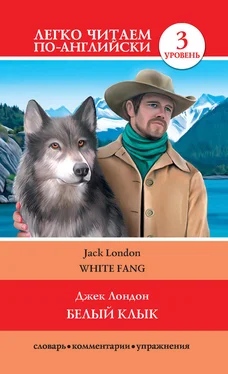

![Джек Лондон - Белый Клык [сборник]](/books/30184/dzhek-london-belyj-klyk-sbornik-thumb.webp)

